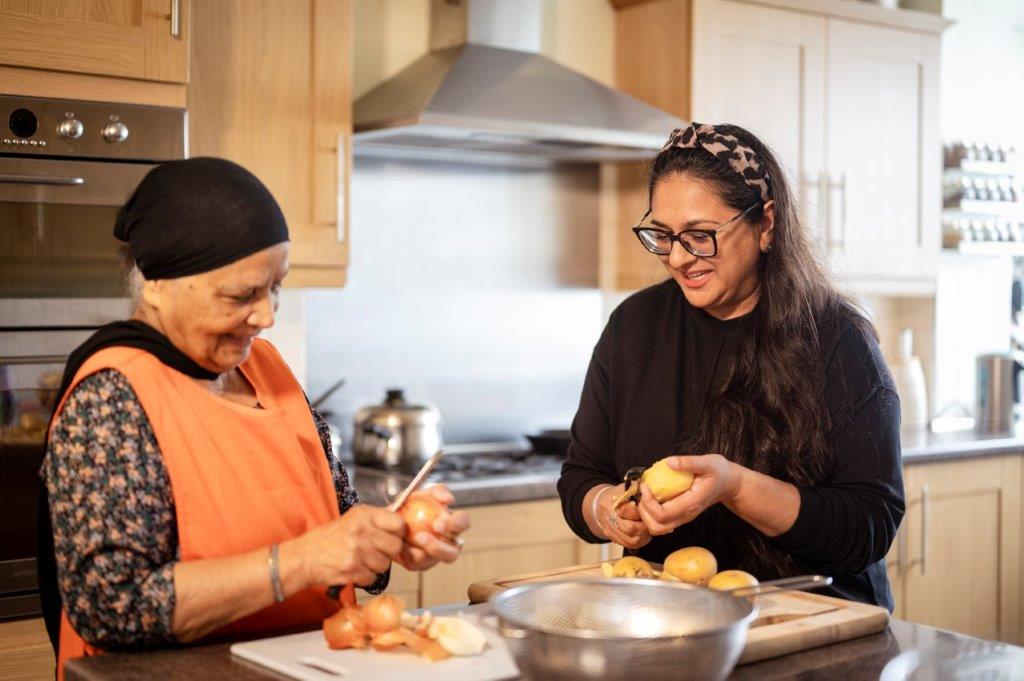By Angela Catley and Sian Lockwood
We are all getting older, and our lives and the lives of the people we care about are changing as a result – sometimes gloriously for the better, sometimes worryingly for the worse…and most often somewhere in the middle.
We two have long careers and lots of experience in the world of care and support with a shared passion for people and communities and making the most of everything that’s strong. Alongside these professional journeys are personal journeys and in recent years, for us both, these two strands of life have merged, blurred and interacted. I think we have always been aware of the tiny range of social care and support services available to older people – things like care homes, home care and day centers. We have probably also been conscious of the view, baked into much of our society, that if we become ‘frail’ or ‘vulnerable’ or ‘lack capacity’ then it is really inevitable that we ‘go into a home’ or get ‘4 calls a day’. Our lives of wisdom, relationships, doing and giving becoming lives of passivity, disconnection, time filling ‘activities’ and ‘needs’…unquestioned, inevitable.
Perhaps, until now, we have never really given that full scrutiny it deserves or stopped to question the implications for us, the people we care about and society as a whole. As Bryony Shannon states in her excellent blog[1]
“The framing of older and disabled people as weak, vulnerable, not all there, less able, is used to justify paternalistic and restrictive practice that excludes people from decisions about their lives. Excludes people from a life.
Looking after. Locking up. Looking away.
Assigning people to boxes with their associated assumptions and judgements leads to one size-fits all responses and solutions. Achieving our efficiencies as we erode unique identities. And viewing people as ‘other’ stifles conversations and aspirations, with little consideration of the vital importance of love, joy, freedom, meaning and purpose.
Reflecting on spending time with people living in a care home, Madeleine Bunting writes that she was “overwhelmed by the sheer scale of human need bursting out of that neat building.”[8]
The visible ache of desire for connection. A desperate need to feel human.”
None of us wants to live in a place we can’t call home. Where we can’t get up and go to bed when we want, eat the things we like, do the things we want; where the people we love and who love us aren’t around; where we feel we have no purpose and know we are not valued. Where the needs and wishes of an organisation sometimes seem more important than our own. None of us.
As we grow older, we secretly hope – even believe with certainty – that we will stay healthy, active, and independent until the day we die – we will be David Attenborough, Judi Dench or Fauja Singh the centenarian marathon runner. We push to the back of our minds the alternative future that will be the reality for lots of us.
Many of us will fund our own care. Acting together, we are potentially a huge force for change – but only if we are clear now about the services and support we want when the time comes for us to need it. But we don’t get together and don’t plan. We act for our parents or friends in a crisis and see the limited choices on offer – then bury our heads when it comes to our own future choices.
We want that to change. Bryony again:
“The dehumanisation of older and disabled people has perpetuated the systems and structures and institutions and roles we’ve created and has in turn distanced detached desensitised dehumanised us sufficiently to prevent us from questioning or challenging this narrative or this practice.
As Maya Angelou reflects, “we have to undo these lessons which have been learned by all of us. And not just taught to us – but we’ve learned them. And so it will be no small matter. But we can undo it. We can learn to see each other and see ourselves in each other…”
As older people/people thinking about getting older, we personally view many of the supports and services currently available for older people with dread. We believe that ageism can underlie the lack of aspiration for people in many of these services. We want the kind of help that will let us stay part of our community, near the people we love and who love us, doing things that feel purposeful and knowing that we are valued.
So, we are opening a space for conversations and positive disruption. We want your help to create a movement for much greater choice. If this resonates with you then please read our more detailed ‘manifesto’, spread the word using the #WhenIGetOld hashtag and get in touch.
We have the power to change things for the better… but first we need to come together.



